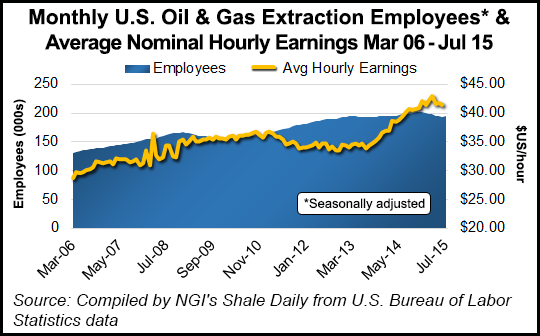Commodity Price Downcycle Offers Opportunities, Say BP, DCP Execs
Waiting for oil and natural gas prices to strengthen isn’t the way to play the downturn, two top U.S. energy executives said Tuesday at the 27th Annual Rocky Mountain Energy Summit.

DCP Midstream CEO Wouter van Kempen shared a podium in Denver with BP plc’s David Lawler, CEO of the Lower 48 operations to discuss the opportunities — and conundrums — from the downturn in global prices.
“For us, for me, it’s simple,” said van Kempen, who runs the largest natural gas processor in the country — and the largest company in Denver. “It’s about controlling what we can control…In the end, we can’t control crude prices. We can’t control natural gas prices. We can’t control natural gas liquids prices. We can’t control geopolitical issues…But we do think we can control how we operate as a company” and ensure the reliability of the assets.
“In our company, we’re really focusing on putting in a framework for how to get through in…any type of commodity environment.” It’s not always a pleasant task, he explained.
In January, DCP cut its corporate workforce by 20% and closed the Oklahoma City office (see Daily GPI, Jan. 30). It was the first layoff ever under van Kempen’s watch. “I think it was the right thing to do for us, but at the same time, it was a difficult thing to do and personally, I hope I never have to do it again in my career.”
All misfortune, said Henry David Thoreau, is but a stepping stone to the future. Van Kempen and Lawler stressed that idea over and again to their audience.
“This is where fortunes are made, at the bottom of the cycle,” Lawler said. “The toughest part is the hard work.”
The Colorado native and former SandRidge Energy Inc. COO took over BP’s onshore business one year ago (see Shale Daily, Aug. 20, 2014). It has been, to say the least, a wild ride.
With BP’s 5.5 million acres of mostly undeveloped property in the Lower 48, Lawler may have thought he had the world on a string. One year ago, BP only had a “minimum number of horizontal wells” and two rigs in operation.
“In my mind, we were going to 30 or 40 horizontal rigs,” Lawler said. He thought, “this is going to be a great thing. At the end of the day, the public companies had pushed the onshore model so that BP effectively had been left behind,” but he knew the company could compete. However, “several months into the role, prices continued to slide…”
BP management was “shocked” at how low crude prices have fallen. Layoffs were imposed. Business units were put in place to focus on value and capital efficiency. “At the end of the day it is about pushing the value equation,” Lawler said.
His onshore ambitions may be smaller than they were a year ago, but his team is doing much more with much less. BP today is running 12 rigs in the U.S. onshore, while the workforce has fallen by about half from 2,300 people (see Daily GPI, July 28; Jan. 26). There’s much more clarity in the onshore business, too (see Daily GPI, April 28).
“We didn’t have the expertise where we wanted it,” Lawler said. Now BP is not only catching up, but it is getting better against the competition.
DCP, which operates in 18 states, is a joint venture between Phillips 66 and Spectra Energy. Because its success hinges on the “health of producers…every time there’s a move in commodity prices, we feel that directly,” said van Kempen. To cope, management last year began sorting through the pieces of its portfolio to make some internal changes.
The operations functions were pushed to the “top of the pyramid,” because “operations really are about what makes you the money,” van Kempen explained. The self described “asset hoarder” also began sorting through what wasn’t generating an adequate rate of return across its 67,000-mile-long system.
Like Lawler, van Kempen said this is the time for career enthusiasts to step up.
Careers “are made in downcycles,” said van Kempen. “It’s an opportunity for learning, for stepping up to the plate, for taking on very different assignments…
“This is the time to raise your hand and say, ‘give me the biggest pile of crap that you have,’” he advised the audience. “You have a problem. You haven’t created it, but if you find a way to solve things, to find different things, it’s a great opportunity in a career to do stuff…”
It’s difficult during severe downturns to keep the best staff, said the DCP chief. “It’s difficult for morale…” But he said there’s more to learn in Midland, TX, than in some corporate environs.
Lawler agreed. “You have to put yourself directly in the way of responsibility,” he advised. “Through those experiences, you survive the tough times. I see a lot of companies that adopt that culture,” noting that EOG Resources Inc. drilled 10 wells in the Eagle Ford Shale before achieving commercial success.
“How many times did George Mitchell try to make wells work?” Lawler asked. “You will never get in trouble for trying something that doesn’t work. It just won’t happen.”
He stressed that achieving any success still depends on playing nice with others.
“The concept of teamwork is so worn out, but folks that do really well in business learn how to be successful by helping others, not being the smartest people in the room…I’m not the smartest…All jobs are just temporary. The opportunity to lead is temporary…When you see that as you are there to help everyone else, that’s when your career takes off…”
© 2024 Natural Gas Intelligence. All rights reserved.
ISSN © 2577-9877 | ISSN © 2158-8023 |
